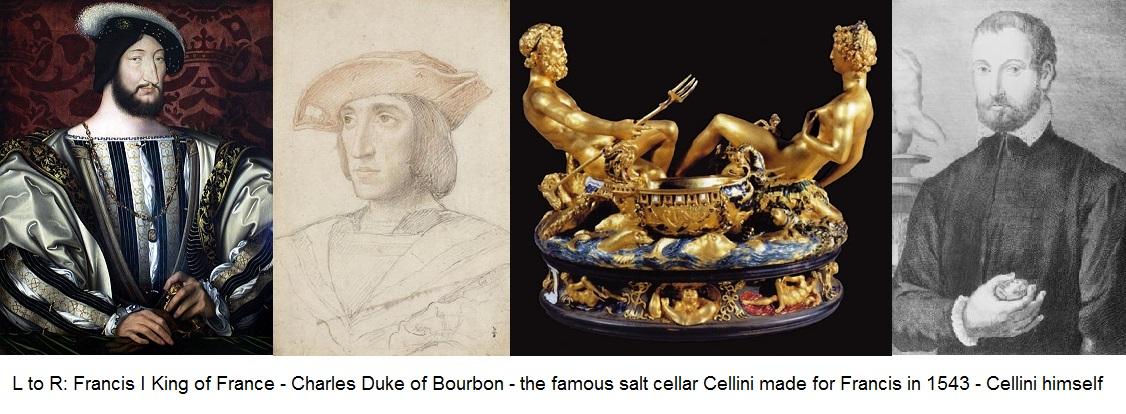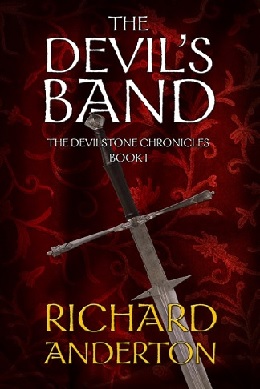THE RELUCTANT REBEL – CHARLES DUKE OF BOURBON
On the 6th of May 1527, the famous Italian artist, sculptor and goldsmith Benvenuto Cellini wasn’t in his workshop. A mutinous army of German, Spanish and Italian mercenaries, led by the maverick French nobleman Charles Duke of Bourbon, had appeared before the gates of Rome and Cellini had rushed to the walls to help defend the city. The rebels wasted no time in launching their first assault and Cellini soon found himself in the thick of the fighting:
“…I aimed exactly at one whom I remarked to be higher than the rest; the fog prevented me from being certain whether he was on horseback or on foot. Then I turned to Alessandro and Cecchino, and bade them discharge their arquebuses, showing them how to avoid being hit by the besiegers. When we had fired two rounds apiece, I crept cautiously up to the wall, and observing among the enemy a most extraordinary confusion, I discovered afterwards that one of our shots had killed the Constable of Bourbon; and from what I subsequently learned, he was the man whom I had first noticed above the heads of the rest…” [extract from Cellini’s autobiography, written c.1558]
Unfortunately Cellini’s efforts were in vain. Rome fell and her citizens were subjected to a whole month of savage, unrestrained pillage. Only when the pope, who’d been kept prisoner in the Castel Sant’Angelo, agreed to pay a ransom of 400,000 ducats did the mercenaries withdraw.
In the aftermath of the Sack of Rome, those who believed in astrology remembered that it’d been foretold that Charles Duke of Bourbon would be slain at the moment of capturing a great city but others wondered how one of France’s greatest soldiers could die leading an army of murderous mercenaries who owed no allegiance except to gold. A decade earlier, Bourbon had been appointed ‘Constable of France’ after defeating the very same rabble that he now commanded so how could one who’d flown so high fall so low?
Like many other generals, both before and since, Bourbon had fallen victim to his own king’s paranoid jealousy and what had made matters worse was his marriage to the unimaginably wealthy Suzanne of Bourbon. Her death in 1521 not only made Charles incredibly rich, it placed him at the head of the House of Bourbon - the chief rival to France’s ruling House of Valois.
One of the great failings of Medieval feudalism was the creation of powerful barons who could challenge royal authority and plunge their country into civil war. The French king Francis knew this so he and his mother Louise of Savoy (who had a tenuous claim to the late Suzanne’s estates) tried to neutralise the Bourbon threat by offering the ageing Queen Mother to the recently widowed duke as a bride. When Bourbon rebuffed her advances, Francis simply confiscated the disputed property and the duke was left with little choice but to seek allies among France’s enemies.
In early 1523 Bourbon fled to the imperial court of Holy Roman Emperor Charles V and together with Henry VIII King of England they hatched a plan to place Bourbon on the French throne. The emperor, who was simultaneously king of Spain, Italy and Germany, would attack through the Alps, Pyrenees and Burgundy whilst Henry, using the English enclave at Calais as his base, would march on Paris.
Had this ‘Great Enterprise’ been successful, the emperor would’ve taken huge swathes of Eastern France as his reward whilst Henry would’ve had the ancestral Plantagenet lands in Normandy, Gascony and Aquitaine restored to the English crown. Bourbon would’ve been left with barely a third of the French kingdom ruled by his rival but what choice did he have?
In the summer of 1523, the Holy Roman Emperor and the King of England launched their invasions of northern, eastern and south western France. Bourbon himself invaded Provence in 1524 and the tide of war ebbed and flowed until the imperials won a decisive victory in northern Italy. However, despite capturing Francis and destroying the French army at the Battle of Pavia [1525], the emperor had been bankrupted the war and was in no position to capitalise on his success. The French king, was not forced to abdicate and once Francis had signed the humiliating Treaty of Madrid [1526] he was allowed to return to Paris.
Meanwhile, with no cash to pay his men, the emperor had been forced to abandon his victorious army in Italy and after two years without pay they mutinied. As the emperor was also King of Rome, the impoverished mercenaries decided to help themselves to the Eternal City’s wealth and they elected Bourbon as their commander. Once again the duke found himself forced into rebellion but he agreed to lead the ragged army as they marched south in search of loot. Had he lived, Bourbon might’ve been able to restrain his troops but fate decreed otherwise.
The brutal Sack of Rome which followed Bourbon’s death scandalised all Christendom, yet not everyone perished in the slaughter and one who survived was Cellini. After being accused of helping himself to some of the pope’s jewels during the looting, Bourbon’s assassin fled to Paris where he became court goldsmith to the King of France. No doubt his shameless claim to have fired the fatal shot that killed Bourbon helped his advancement at Francis’ court but perhaps the duke had the last laugh. In 1589 Henry III last Valois king of France died and his successor, Henry IV, was a Bourbon.

